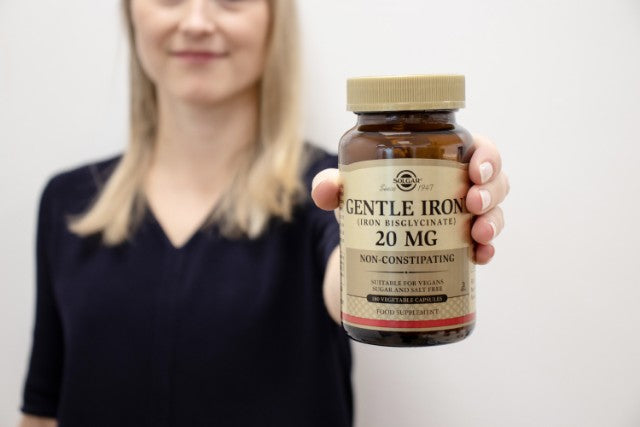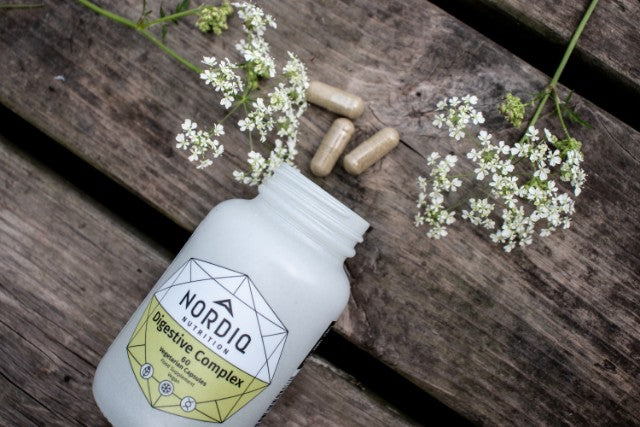Combining and Cycling Nutritional Supplements – Learn These Nutritionist’s Tips!
Many things affect the combination of food supplements and their sensible sequencing. So it is not very simple. In this story, you will learn the tips of Ruohonjuuri´s nutritionist to clarify the matter.

What rules of thumb should you keep in mind when combining different nutritional supplements?
Many people use several nutritional supplements simultaneously. Is it true, for example, that vitamins should be consumed mostly in the morning and dietary mineral supplements in the evening?
“If you want convenience, one of the mot effective options is to choose a great multivitamin supplement that provides a balanced set of nutrients. It’s practically suitable for everyone. A good rule of thumb is to consume vitamins in the morning and minerals in the evening. This is largely based on the fact that vitamins B and C have an invigorating effect on people, Ruohonjuuris nutritionist Eijaliisa Koivu explains.
“It’s important to remember to take fat-soluble vitamins with food to ensure optimal absorption. My personal rule of thumb is the letter combination K-A-D-E: in other words, vitamin K, vitamin A, vitamin D, and vitamin E. So KADE vitamins should always be taken with food,” Eijaliisa suggests.
What to consider when combining herbal products with each other and with other food supplements?
Are there any herbs that should definitely be taken in the morning or in the evening?
“Herbs and herb-based medicine are naturally pure and wonderful nutrients that can be consumed completely as is. Herbs and herb-based medicine are generally well-suited for use with dietary supplements. It’s worth remembering, however, that sensitive people might experience adverse effects from herb-based medicine, for example if you happen to be allergic to certain herbs or medicines. The period of use and the dose also have an effect – as well as the person’s health, age, weight and several other factors. Even seasons have an impact, and Ayurveda for example has separate recommendations for various body types and seasons. So there is no simple answer.
“The good thing about herb-based medicines is that they are quickly absorbed, so in the best-case scenario you’ll already feel the effects in half an hour – or two hours, at the latest. Acute effects last for a few hours, and more subtle effects are experienced after prolonged use – approximately 1–3 months after starting use.
“Stimulating herbs (such as cinnamon, that promotes digestive health) should be consumed in the morning, and soothing ones (such as hormonal balancing avena sativa) in the evening. It’s important to think about the purpose of use of the herb concerned before planning the time of day to take it. It’s also preferable to consume herb-based medicine with food to avoid stomach irritation or if you have a sensitive stomach.
“Occasionally, the news includes shocking headlines about the side effects of combining herb-based medicine and medicine. In general, if you’re taking any medicine, you should always make sure that it’s safe to use herbs and herb-based medicine in combination with it. The most common ones include anticoagulants, heart and blood pressure medicine, diabetes-related drugs, and some antibiotics,” Eijaliisa remarks.
What should one take into consideration when using iron supplements?
“These days, stored iron or ferritin is a common topic of discussion. If the level is low, you should pay special attention to consuming iron supplements. Calcium prevents iron absorption, and magnesium may have a similar effect. You should not use dairy products for at least four hours before taking iron supplements. Similarly, coffee and tea as well as phytic acid in grains can affect iron absorption. In general, you shouldn’t consume any supplements with coffee or tea, which is in contradiction with our traditional breakfast culture. We often tend to drink coffee, eat breakfast, and consume dietary supplements in the morning. Therefore, you should keep your coffee-sipping and vitamin and other supplement intake separate, so that all the nutrients are well-absorbed,” Ruohonjuuri’s nutritionist reminds us.
“Iron intake should be separate from other supplements and food, especially if you have a sensitive stomach. Ruohonjuuri, of course, offers iron supplements where the iron has been amino acid chelated, so the iron is combined with amino acid. This protects the iron through the intestines so such iron supplements can be taken together with any other food. One great option is the researched and tested oral spray, where iron is absorbed in an effective manner, directly from the cheek mucosa,” suggests.
“If you consume a lot of iron, your body’s calcium stores will dwindle. So you shouldn’t consume iron just in case. If you really want to know the iron levels in your body, I suggest you get your ferritin and hemoglobin levels measured.
“Black pepper piperine also increases iron absorption, and vitamin C should also be taken to enhance it. Recently, the intake of small doses of an iron supplement has been discussed (or, for example, every other day): this might also enhance iron absorption. The logic is that this way the body stays “greedy” for the nutrient.

Taking a break from food supplements – is it required?
What about taking a break from food supplements? At least when using adaptogenic herbs, it might be beneficial to take a break from time to time. Why is this the case and what kind of breaks do you recommend? What about using other supplements – is taking a break worth it?
“Sometimes breaks are useful: you should remember that supplements are exactly that. When your body receives a certain substance after a break, it’s more receptive to it. That’s why it makes sense to take breaks from food supplements. Quality and quantity are key, because our bodies can only utilize a limited amount of a certain nutrition at a time, the nutritionist advises.
“It’s worth taking a break of up to a month or two from herb-based medicine. More gentle herbs such as reishi can be consumed for longer periods before taking a break. You can take a break of couple of days a week from the usual supplements. Actually, vitamin D and B12 are the exceptions (especially for vegans), and they should be eaten year-round. I recommend vitamin D to everyone all year round, especially here in the north. On trips to the summer cottage, you can leave the nutritional supplements home with a good conscience and take a break,” Eijaliisa suggests.
Which supplements should not be consumed simultaneously? And why?
“Now we’re entering a real jungle. There are many supplement pairs that work really well together, such as magnesium and vitamin B6. Zinc and copper, for example, are good examples of interdependent nutrients (antagonist pairs). If you consume a lot of zinc, your body’s copper levels can drop. If, for example, you only consume a zinc supplement for over a month, this should be supplemented with a similar amount of copper supplement. If you consume zinc and copper simultaneously, my recommendation is to take them at different times of the day.
“Of course calcium and iron should be taken separately. Vitamin E and Coenzyme Q10 (also known as ubiquinone) block each other so they shouldn’t be consumed simultaneously.”
Which supplements have more benefits when consuming simultaneously, than if they were consumed separately?
“Usually it’s beneficial to consume dietary supplements at the same time. Vitamin A always needs fat to be absorbed, and this is also the case for other fat-soluble vitamins, so omega supplements are an excellent choice.
“Vitamin D and iron are also linked, so that if your iron store levels are low, vitamin D absorption suffers.
“Vitamin D and calcium and vitamin C and calcium are both great combos.
“Vitamin E is supported by vitamin C.
“Sun capsules have taken into consideration vitamins and minerals such as selenium and vitamin E, which act as antioxidants in the body in the fight against free radicals.
“Copper and vitamin C are also a great combo – especially in summer – copper contributes the normal pigmenting of the skin and vitamin C contributes the normal collagen forming for normal function of the skin".
“There’s a huge number of these pairs, but here we list a few. Anyway, you shouldn’t stress too much about them as long as you remember to include vitamin C with iron and to separate it from calcium. Also, remember sufficient copper intake if you’re eating zinc supplements over a long period,” our nutritionist says.
“Nowadays you can mostly trust multivitamin products, because usually the synergy benefits have been thought out if it’s a high-quality dietary supplement. Stress also affects the overall wellbeing of the body and the absorption of nutrients
“If a person experiences a lot of stress, I would start with addressing it and then boost other aspects of wellbeing. The intestines are super important in everything,” Eijaliisa reminds us.

Dietary supplements aren’t really beneficial if they’re not absorbed
How can you make sure you’re buying a high-quality, easily absorbed dietary supplement?
“Good things don’t go cheap. This is also true with supplements. The cheapest supplements may contain a lot of suspicious sweeteners, fillers and additives. If the list of ingredients sounds strange, you should question whether all those ingredients are really necessary. Personally, of course, I recommend getting supplements from a health store or Ruohonjuuri. Ruohonjuuri has strict quality criteria for their products on the customer’s behalf,” Eijaliisa points out.
“You should focus on quality instead of quantity when it comes to dosage instructions. It’s safe to follow the recommendations given on the packaging. Vitamin D is the only exception, in my opinion, since the recommended intake in Finland is quite low. Amino acids should be consumed separately, so that proteins from food do not interfere with absorption. You should also be careful not to ingest medicine and supplements at the same time,” Eijaliisa cautions.
Check out Ruohonjuuri´s quality food supplements > >
Health claims / EFSA:
M-2008-1061 4386 - Cinnamomum verum-Bark-Cinnamon - Digestive health
M-2008-1061 4360 - Avena sativa-Seeds-Oat straw - Hormonal Balance